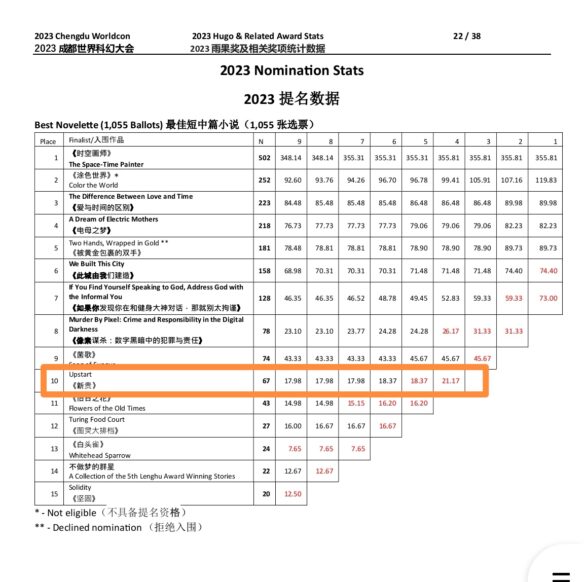2023 Hugo Nomination Report Has Unexplained Ineligibility Rulings; Also Reveals Who Declined (original) (raw)

The 2023 Hugo Award Stats Final report posted today on the official Hugo Awards website revealed that the Chengdu Worldcon’s Hugo award subcommittee made many startling and sometimes unexplained rulings.
R. F. Kuang’s novel Babel, winner of the 2023 Nebula and Locus Awards, was ruled “not eligible” without explanation, even though it had the third most nominations. The EPH point calculation used to determine the Hugo finalists shows the count for Babel was stopped in the first round, and it accrued no more points when other works were eliminated in the automatic runoff.


(The Google Translate rendering of the Chinese is “Not eligible for nomination.”)
Paul Weimer was another “not eligible” kept off the ballot without explanation, despite having been a Best Fan Writer finalist for the past three years. Weimer had the third most nominating votes this year – and in that category the EPH calculation was completed, showing he ended up with the second highest point-count.
A third such “not eligible” was Xiran Jay Zhao, ruled out of the Astounding Award. As noted here in a comment on the announcement post, it should be impossible for a first-year-of-eligibility Astounding Award finalist to be ineligible the following year unless either they already won the award or the original Hugo committee (Chicon 8) erred in their eligibility determination.
And episode 6 of Neil Gaiman’s series The Sandman (“The Sound of Her Wings”) was labeled “not eligible” without explanation, while the series itself was disqualified from Best Dramatic – Long Form under Rule 3.8.3. The WSFS Constitution’s rule 3.8.3 says a series can be a Best Dramatic Presentation – Long Form finalist, or an episode of the series can be a Best Dramatic Presentation – Short Form finalist, but only one or the other may be on the ballot, the nod going to whichever gets the most nominating votes. Once the episode was removed there was no longer a rule 3.8.3 conflict. Keeping Neil Gaiman’s work off the ballot entirely was the result, however explained.
File 770 asked Dave McCarty, a Chengdu Worldcon vice-chair and co-head of the Hugo Awards Selection Executive Division, the reason for these “not eligible” rulings. He replied:
After reviewing the Constitution and the rules we must follow, the administration team determined those works/persons were not eligible.
File 770 then asked Kevin Standlee, among the best-known interpreters of the WSFS Constitution, what rules there could be in addition to the Constitution. Standlee pointed me to his article posted today, “Elections Have Consequences”.
…An overwhelming majority of the members of WSFS who voted on the site of the 2023 Worldcon (at the 2021 Worldcon in DC) selected Chengdu, China as the host of the 2023 Worldcon. That meant that the members of WSFS who expressed an opinion accepted that the convention would be held under Chinese legal conditions….
…When it comes to local law, this could end up applying anywhere. Here’s an example I can use because as far as I know, there are no Worldcon bids for Florida at this time. Imagine a Worldcon held in Florida. It would be subject to US and Florida law (and any smaller government subdivision). Given legislation passed by Florida, it would not surprise me if such a hypothetical Florida Worldcon’s Hugo Administration Subcommittee would disqualify any work with LGBTQ+ content, any work with an LGBTQ+ author, or any LGBTQ+ individual, because the state has declared them all illegal under things like their “Don’t Say Gay or Trans” laws and related legislation….
Fans are clearly expected to infer these Hugo eligibility decisions were made to comply with Chinese rules or authority, but no one is saying what Chinese rules the Hugo subcommittee was operating under, unlike Standlee’s hypothetical which is based on Florida laws and policies that can actually be pointed to. Another unaddressed question is whether the administrators made these decisions on their own, voluntarily, because they were afraid not to disqualify certain people, or because they were told by someone in authority that’s what they should do.
Paul Weimer has written a response to being ruled ineligible on his Patreon – “Chengdu, I want some answers. Dave McCarty, I want an explanation. I am owed one.”
OTHER RULINGS. In a few cases, the report explains an item’s ineligibility in a footnote.
Best Related Work – The History of Chinese Science Fiction in the 20th Century was disqualified because one of the authors was on the Hugo subcommittee.
The Art of Ghost of Tsushima was first published in 2020.
Best Dramatic Presentation – Long Form – Andor (Season 1) and Sandman – Rule 3.8.3 (knocked off the ballot because individual episodes got more votes in the Short Form category)
(And yet down below the individual episode of Sandman was knocked off the ballot as an unexplained “not eligible.” What kind of Catch-22 is that?)
Best Dramatic Presentation – Short Form – The Severance episode was a Rule 3.8.3 disqualification going the other direction (the series made the ballot).
The Deep. — Deep Sea, which is the Chinese translation given in the report, is said in a Chinese footnote to have been “published years ago.” (Alternatively, this could refer to the animated movie Deep Sea, whose release date per IMDB was 2023, later than the eligibility period.)
In one case it is possible to deduce the likely reason for the “not eligible” ruling though not explicitly said in the report.
Novelette – “Color the World” by Congyun “Mu Ming” Gu was first published in 2019 (see “Stories 小说 – Congyun “Mu Ming” Gu”).
But it is not explained why Hai Ya’s “Fogong Temple Pagoda” was ineligible for Best Short Story, although the problem must not have been with the author because his “Space-Time Painter” won the Best Novella Hugo.
DECLINED NOMINATIONS. S. B. Divya’s public announcement about declining two Hugo nominations encouraged speculation at the time that many more people were following suit as a political protest. In fact there were not that many refusals, and it’s not demonstrable that any of the others were protests.
Who declined?
Becky Chambers — (Novella – “A Prayer for the Crown-Shy”)
S. B. Divya — (Novelette “Two Hands, Wrapped in Gold”; also removed her name from the list of Hugo-nominated semiprozine Escape Pod’s team members_._ See “Why S. B. Divya Declined Two Hugo Nominations”.)
Prey – (film – from Best Dramatic Presentation – Long Form)
Guo Jian – (from Best Professional Artist)
CUI BONO. Who got on because people declined?
Novella – Where the Drowned Girls Go by Seanan McGuire – which went on to win the Best Novella Hugo.
Novelette – “Murder by Pixel: Crime and Responsibility in the Digital Darkness” by S. L. Huang
Best Professional Artist – Zhang Jian
Who got on where works or people were declared “not eligible” for one reason or another?
Best Novel – The Daughter of Doctor Moreau by Silvia Moreno-Garcia
Best Novelette – “If You Find Yourself Speaking to God, Address God with the Informal You” by John Chu
Best Short Story – “Resurrection” by Ren Qing
Best Related Work – The Ghost of Workshops Past by S.L. Huang and Buffalito World Outreach Project by Lawrence M. Schoen
Best Dramatic Presentation – Avatar: Way of Water; Black Panther: Wakanda Forever; Severance (season 1)
Best Fan Writer — HeavenDule
ERROR WILL BE CORRECTED. In the Best Novelette category “Turing Food Court” appears on two different lines of the report. Hugo Administrator Dave McCarty explained, “It 100% is a copy/paste error that I missed in the dozens of back and forths between me and the Chinese folks handling translations.”
UPDATE 01/20/2024. The amended report is now up. Here is the corrected Novelette page. (Thanks to Mr. Octopus for the story.)

Update 01/28/2024: Added a paragraph to make the ineligibility of Neil Gaiman’s works part of the lede. That had only been discussed in the category analyses.
Discover more from File 770
Subscribe to get the latest posts sent to your email.